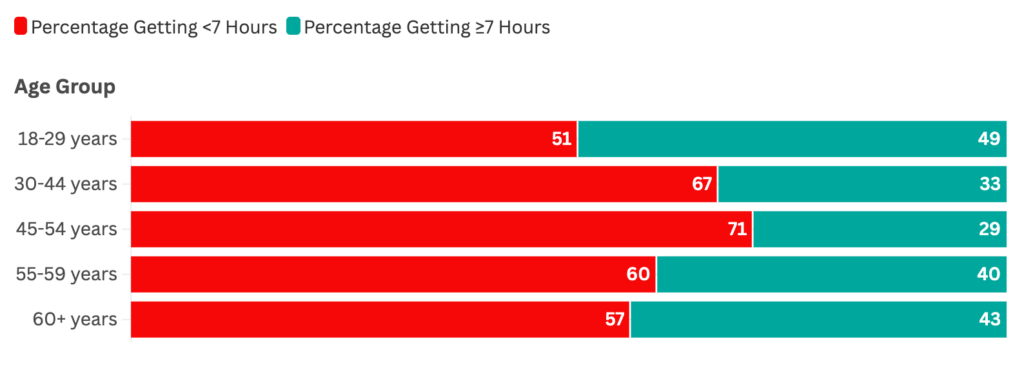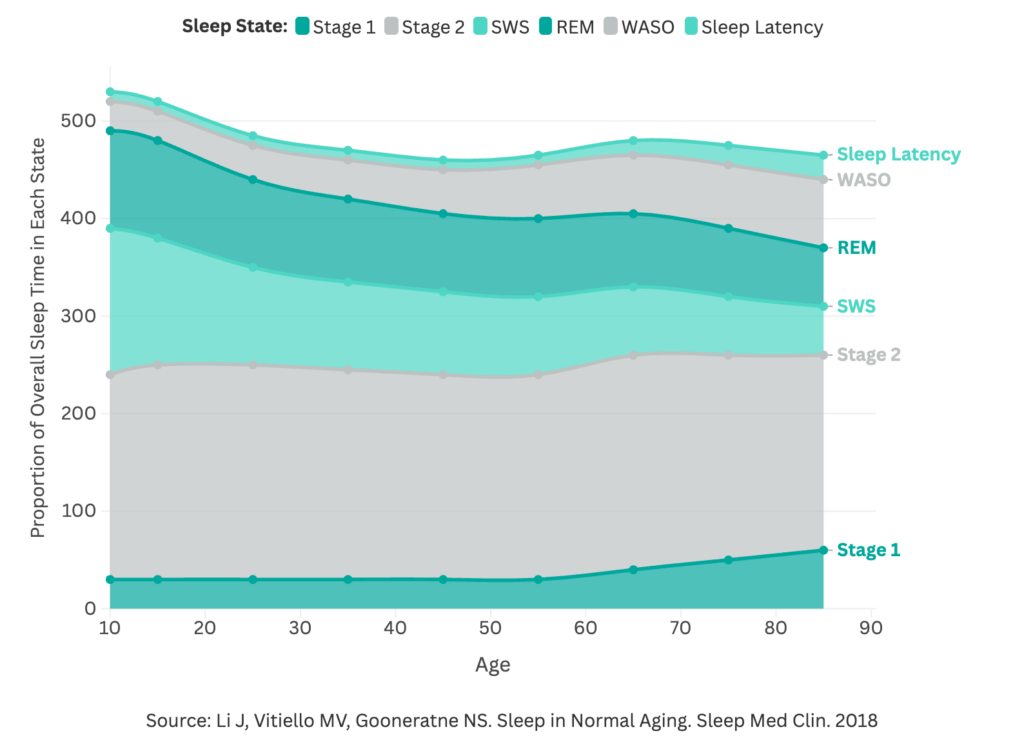When it comes to enjoying a longer, healthier life, most people know that what you eat and your level of fitness are going to play an important part – but fewer people think about sleep as another essential part of that puzzle.
The reality is, quality sleep is every bit as important as movement and nutrition. In fact, research tells us that people who get their sleep right may be enjoying 5 more years of healthy life compared to those who don’t. Despite this, and despite doing it every day, sleep is rarely given the thought it deserves.
In this blog, we’ll take a closer look at sleep – including how it’s an important part of maintaining a healthy weight, how it impacts stress and other mental well-being factors, and, ultimately, how getting it right helps you live longer. We’ll also share some tips on what the science tells us about getting a good night’s sleep.
The Fundamentals: What Happens When We Sleep?
Sleep isn’t just rest. It’s more accurate to think of it as an active biological process when your body and brain perform critical maintenance tasks.
As you sleep, your body:
- Repairs muscles and tissues
- Regulates hormones like growth hormone and testosterone
- Processes and stores memories
- Flushes out waste and toxins from the brain
This deep restoration supports every major body system. Sleep strengthens your immune response, reduces chronic inflammation (a key driver of ageing), and keeps your metabolism functioning smoothly. Poor sleep, on the other hand, disrupts these processes and accelerates biological ageing.

Cognitively, consistent sleep is your brain’s best defence against decline. During sleep, the brain clears out harmful proteins linked to Alzheimer’s, consolidates learning and recharges your ability to focus and make decisions. Over time, this adds up to better brain health and a longer health span.
Why Poor Sleep Matters
If you consistently miss out on good-quality sleep, the impact goes well beyond that alarm-clock-inspired grogginess you get after opening your eyes. Chronic sleep deprivation is linked to a host of serious health conditions, including:
- Heart disease and high blood pressure: Even one night of poor sleep can elevate your blood pressure. Over time, this strains your cardiovascular system.
- Weight gain and fat storage: Lack of sleep disrupts hunger hormones like ghrelin and leptin, making you crave more calories. Your body also tends to store that extra energy as visceral fat—the type that surrounds organs and fuels inflammation.
- Insulin resistance and diabetes: Poor sleep interferes with glucose metabolism, increasing the risk of type 2 diabetes.
- Depression and cognitive decline: The longer you go without enough sleep, the greater your risk for mood disorders and memory loss.
Sleep loss has such an impact on the body’s systems that even increases the likelihood of accidents. One study found that sleeping just six hours per night raised the risk of car crashes by 33%. That might feel like no big deal if you get the tube to work – but the headline here is that even just a seemingly small reduction in the amount of time asleep significantly impairs how effectively your brain is working.
So, what qualifies as “chronic sleep deprivation”? A lot of people are surprised to discover that, for adults, it’s defined as getting less than 7 hours of sleep each night. The odd night of less than 7 hours won’t immediately put you into this category – but when it occurs over weeks and months, the impact on your well-being becomes measurable.
We explored the data from a series of different studies over the last 5 years and discovered that, in every age group surveyed or studied, the majority of people do not get this minimum of 7 hours of sleep each night, making the most of us sleep deprived:

Sleep Quantity vs Sleep Quality
Now, it’s fair to say that this 7-hour measure is just an initial benchmark since sleep deprivation can take different forms. For some people, sleep deprivation happens because you’re awake rather than sleeping – i.e. bed at 12:30am, up at 6:30am. However, for others, it’s a sleep quality issue – you might head to bed at 10:00pm and hear the alarm at 7:00am, but if your sleep quality is poor, you can still find yourself sleep deprived after what seems like an adequate amount.
Some people will be aware of a broken night’s sleep, especially if you need to use the bathroom or you’ve been disturbed. However, many of the sleep disturbances people experience don’t involve waking up – it’s simply not getting to the optimum level of sleep, despite being in a slumber.
So, how do you know if you’re getting 6-7 fantastic hours of sleep or 8-9 very poor hours? This is where sleep tracking is tremendously helpful. Many wearables (smart watches, trackers, smart rings) will give you an exceptionally clear picture of the quality of your sleep. Equally, some apps on your phone will also do a good job.
Tracking your sleep can be useful – but it isn’t essential. Instead, some people just assume that their sleep isn’t optimal and try to improve it – gauging any improvement against how you generally feel. This is a slightly less scientific approach – but any improvement is a positive step.
If you want to get a feel for the quality of your sleep at the moment, this quiz from sleepfoundation.org is a handy resource. It takes 3-4 minutes to run through the 28 questions, and you’ll need to enter your email to see your score, but it gives you some factors to think about.
Doesn’t Our Sleep Requirement Change as We Age?
If you’re thinking back to (or currently enjoying) your twenties and feeling like energy never seemed to fade, you might be right. As you get older, your sleep patterns change. It’s not that you need less sleep – most adults still require 7 or more hours – but the structure of your sleep shifts.

The key changes as we age include:
- Less deep sleep: The body spends more time in lighter sleep stages.
- Circadian rhythm changes: You may feel tired earlier in the evening and wake earlier in the morning.
- Reduced melatonin production: The hormone that promotes sleepiness declines with age.
These changes can make sleep feel more fragmented, but they aren’t necessarily harmful if you still wake up feeling rested. That said, if you find yourself regularly tired during the day, that’s a sign your sleep quality or duration needs attention.
Can You Sleep Too Much?
Yes – there is such a thing as too much sleep, and it’s not a sign of peak health. Oversleeping (more than 9-10 hours per night) has been linked to a series of health issues, including higher risk of stroke, increased body mass index (BMI), and symptoms of depression.
In many cases, poeple find that oversleeping is a symptom rather than a cause. Conditions like sleep apnea, depression, and chronic illness can all result in longer sleep durations or daytime drowsiness. If you consistently need more than 9 hours to feel rested, it’s well worth speaking with your doctor to rule out any underlying issues.
How to Sleep Better for Longevity
As personal trainers, recovery is a factor that’s always on our minds – and, frankly, sleep is the ultimate recovery tool. As such, we often support people to improve their ‘sleep hygiene’ – a term used to describe the conditions surrounding sleep.

These are evidence-backed sleep hygiene factors that will almost certainly improve sleep quality for most people.
1. Stick to a Schedule
Go to bed and wake up at the same time every day, even on weekends. This consistency reinforces your body’s natural sleep-wake cycle.
Now, if you’re especially fond of those mornings where the alarm doesn’t go off, this might sound like a tall order – but stick with us for a second.
Many people sleep in at the weekend simply because their weekday sleep is very poor, leaving them exhausted when Friday evening rolls around. When your whole week’s filled with quality sleep, you’ll feel less inclined to lie in at the weekend. That might feel hard to believe right now – but trust us on this one.
2. Build a Bedtime Routine
It’s often a good idea to wind down with a predictable series of calming activities – be it, reading, stretching, brushing your teeth, skincare, and so on. Over time, your brain learns that these cues signal it’s time to rest – switching from alert-mode into relaxed-mode.
3. Make the Bedroom a Sleep Zone
- Keep it dark, quiet, and cool (ideally between 15.6 to 20 degrees Celsius)
- Remove or dim electronic devices
- While it can feel appealing to lay on your bed and use your phone, it’s far better if you can reserve your bed for sleep
Even small amounts of light can suppress natural melatonin, so consider blackout window coverings or a sleep mask.
4. Avoid Late-Night Stimulants and Food
Caffeine, alcohol, and heavy meals close to bedtime can interfere with falling and staying asleep. Ideally, aim to finish eating at least 2-3 hours before bed.
5. Move Your Body
Moderate exercise – like walking, strength training, or low-impact cardio improves sleep quality. In particular, it increases the amount of slow-wave (deep) sleep that your body needs for recovery.
That said, it’s a good idea to avoid intense workouts right before bed, as they can be too stimulating.
6. Evaluate Medications
Some common medications, especially for blood pressure or chronic pain, can disrupt sleep. Perhaps obviously, you shouldn’t just discontinue these – but if sleep issues persist, it might be worth reviewing medications with your doctor.
7. Watch for Sleep Disorders
If snoring, gasping, frequent wake-ups or excessive daytime fatigue are issues, sleep apnea could be at play. This common but seriously underdiagnosed condition can have a major impact on longevity.
How to Improve Sleep Hygiene in a Meaningful Way
You might be under the impression that a personal trainer will be all in favour of making huge changes to your lifestyle in the quest for better health, improved strength, or weight loss – but this really isn’t the case, and it certainly isn’t when it comes to improving your sleep.
As with all health-boosting habits, the key is to start small, making manageable changes to your routine that will stick with minimal effort and disruption. So, if there are a few different areas where you could potentially improve your sleep hygiene, we’d strongly suggest starting with just one and seeing if you can make that stick for a month. For instance, if you regularly eat just before bed, see if you can create that 2-3 hour gap between your final meal and bedtime.

If you can make that first change work, then look at making the next tweak. Over the course of weeks or months, you can make significant changes that don’t feel like a massive disruption to life.
Can Sleep Medications Help?
Now, for many people struggling with sleep, reaching for a sleep aid can feel like the only option – and that’s completely understandable. When you’re exhausted, the promise of quick relief is hard to resist. However, you’ll have noticed we haven’t mentioned these in our tips on getting better sleep.
Sleep medications can be helpful in the short term, particularly when prescribed by a healthcare professional to manage acute stress or break a cycle of insomnia. However, they don’t always promote deep, restorative sleep. Some reduce the time spent in REM and slow-wave sleep, which are vital for recovery and brain function.
Over time, reliance on sleep aids may interfere with your body’s ability to establish a natural sleep rhythm. Tolerance can also develop, requiring higher doses for the same effect – and possibly increasing the chance of side effects, not least the next-day-grogginess that so many people report.
This doesn’t mean prescribed sleep medications should be avoided – only that they’re best seen as one tool among many. If you’re using them regularly, it’s worth discussing long-term strategies with your doctor. Often, improving your sleep environment, routine, or stress levels can be just as effective – without the side effects.
In Summary: Sleep Well, Live Well (and Longer)
Although it can feel like it, sleep isn’t just a passive part of your day – it’s one of the most powerful tools you have to support your long-term health and well-being.
From regulating hormones and maintaining a healthy weight to protecting your heart and brain, good sleep lays the foundation for a longer life spent in good health. While too little (or even too much) sleep can be harmful, the sweet spot of 7–9 quality hours a night is where science tells us the most significant benefits are found.
Just like movement and nutrition, better sleep starts with manageable habits. Creating a consistent routine, keeping your sleep environment cool and dark, moving your body during the day, and addressing any medical concerns can all help you sleep deeper and feel better.
And if sleep has become a struggle, know that you’re not alone – there are gentle, manageable, and effective ways to turn it around. A good personal trainer can share ideas and check-in with you, helping you feel accountable and focused on this key area.
Ultimately, when you invest in your sleep, you’ll reap dividends in every other part of your health journey – because living longer starts with resting better.
